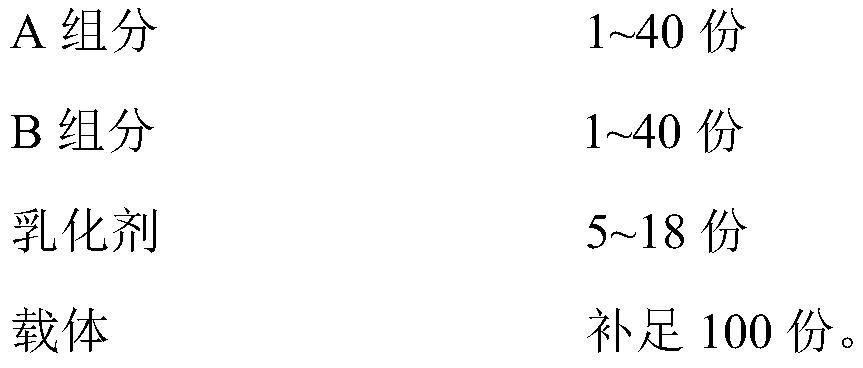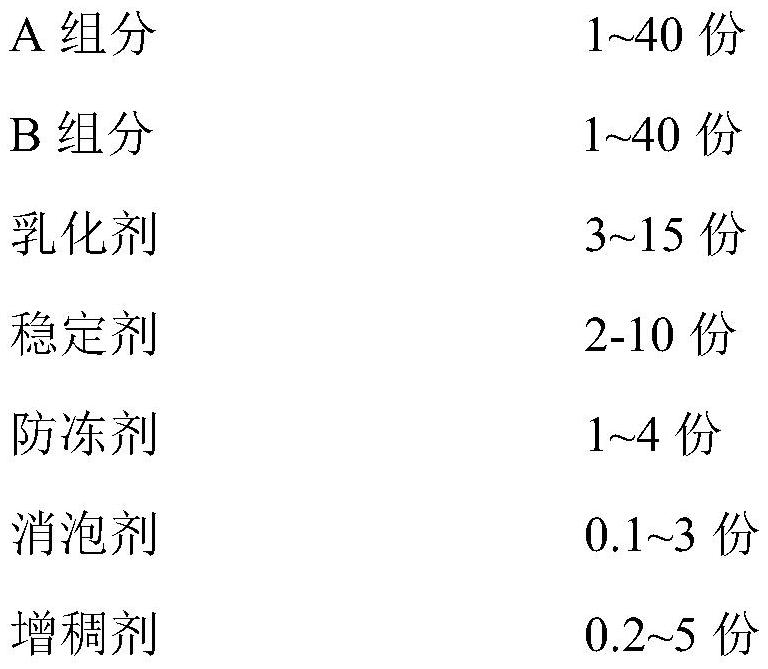Insecticidal composition and application thereof in pest control
An insecticidal composition, a technology for controlling pests, applied in the directions of application, insecticide, biocide, etc., can solve the problems of single application method and few types of pests, etc., achieve a wide range of effects, reduce the frequency of use, and reduce the amount of use Effect
- Summary
- Abstract
- Description
- Claims
- Application Information
AI Technical Summary
Problems solved by technology
Method used
Image
Examples
Embodiment 1
[0059] Calculate the toxicity index and co-toxicity coefficient (CTC) of the drug by calculating the co-toxicity coefficient of the compound according to the toxicity index.
[0060]
[0061] Theoretical toxicity index (TTI) = ∑ (the toxicity index TI of each single agent × the percentage of single agent in the mixture)
[0062]
[0063] Experimental judgment basis:
[0064] When CTC≤80, the composition exhibits antagonistic effect; when 80
[0065] Mix 2-chloro-5-((4-phenoxyphenoxy)methyl)thiazole and dipropacyclopyrene at a weight ratio of 40:1 to 1:40 to obtain a variety of compositions, select several of them The composition corresponding to the specific weight ratio measures its toxic effect on the jujube gall mosquito, and the test results are as shown in Table 1:
[0066] Table 1 Comparison of the virulence test results of Jujube gall midge
[0067] ...
Embodiment 2
[0076] Experimental effect calculation method and experimental judgment basis: the same as in Example 1.
[0077] Mix 2-chloro-5-((4-phenoxyphenoxy)methyl)thiazole and dipropacyclopyrene at a weight ratio of 40:1 to 1:40 to obtain a variety of compositions, select several of them The composition corresponding to the specific weight ratio measures its toxic effect on Thrips floridae, and the test results are as shown in Table 2:
[0078] Table 2 compares the toxicity test results to Thrips floridae
[0079]
[0080] Analysis of experimental results: It can be seen from Table 2 that:
[0081] 1) The measured toxicity index (ATI) of 2-chloro-5-((4-phenoxyphenoxy)methyl)thiazole and dipropacyclopyrene in the weight range of 20:1-1:40 were both Higher than the toxicity index (TTI). Especially in the weight ratio range of 2-chloro-5-((4-phenoxyphenoxy)methyl)thiazole and dipropacyclopyrene in the range of 8:1-1:40, the ATI is much higher than the TTI, indicating that The syne...
Embodiment 3
[0088] Experimental effect calculation method and experimental judgment basis: the same as in Example 1.
[0089] Mix 2-chloro-5-((4-phenoxyphenoxy)methyl)thiazole and dipropacyclopyrene at a weight ratio of 40:1 to 1:40 to obtain a variety of compositions, select several of them The composition corresponding to the specific weight ratio measures its toxic effect on rice planthopper, and the test results are as shown in Table 3:
[0090] Table 3 Comparison of the virulence test results of rice planthopper
[0091]
[0092]
[0093] Analysis of experimental results: It can be seen from Table 3 that:
[0094] 1) 2-Chloro-5-((4-phenoxyphenoxy)methyl)thiazole and dipropacyclopyrene in the weight range of 40:1-1:20, the measured toxicity index (ATI) were all Higher than the toxicity index (TTI). Especially 2-chloro-5-((4-phenoxyphenoxy)methyl)thiazole and dipropacyclopyrene in the weight ratio range of 8:1-1:8, ATI is much higher than TTI, indicating The synergistic effec...
PUM
 Login to View More
Login to View More Abstract
Description
Claims
Application Information
 Login to View More
Login to View More - R&D
- Intellectual Property
- Life Sciences
- Materials
- Tech Scout
- Unparalleled Data Quality
- Higher Quality Content
- 60% Fewer Hallucinations
Browse by: Latest US Patents, China's latest patents, Technical Efficacy Thesaurus, Application Domain, Technology Topic, Popular Technical Reports.
© 2025 PatSnap. All rights reserved.Legal|Privacy policy|Modern Slavery Act Transparency Statement|Sitemap|About US| Contact US: help@patsnap.com



